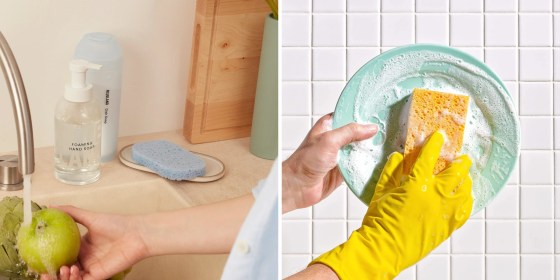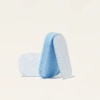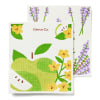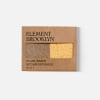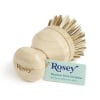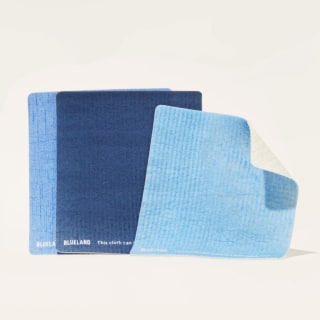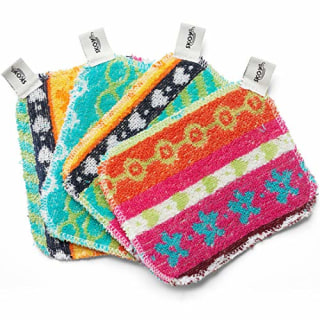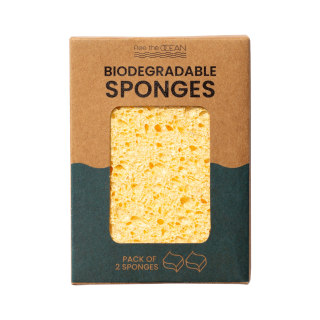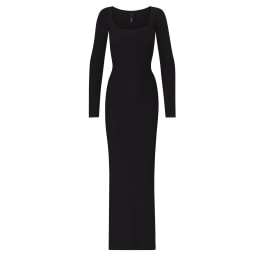Up until recently, I wouldn’t have been able to tell you exactly what my dish sponge is made of. I use them daily to scrub plates, silverware, cutting boards, and reusable water bottles but I didn’t actually know that much about what they’re made of. After doing some research and speaking with experts, I learned that most sponges are made of some form of plastic — probably starting with the prefix “poly,” meaning it’s a synthetic polymer, like polyester, polypropylene, polyurethane and polyethylene.
Typically, one of the most pressing questions I, and likely a lot of others, have when it comes to everyday products that come in contact with food surfaces — like storage containers, nonstick cookware and kitchen utensils — is whether or not they shed harmful microplastics, and if so, how much of a risk do they pose to our health.
To learn more, I chatted with a microplastics researcher and two scientists for their input.
Do sponges release microplastics?
The short answer: Yes, plastic sponges have the ability to release microplastics, largely due to the constant friction they endure every day, according to Paul Anastas, a scientist and chemistry professor at Yale’s School of the Environment. This process is known as leaching and it’s something that also happens when you heat plastic, such as in a microwave, or when plastic materials come in contact with hot water, according to Tracey Woodruff, a microplastics researcher and professor of reproductive sciences at University of California San Francisco.
These microplastics can “flake off onto your kitchen counters, cutting boards, dishes, and anything else you may use them on,” according to Melissa Valliant the communications director at Beyond Plastics, a nonprofit organization dedicated to ending plastic pollution. Researchers have found microplastics in several parts of the human body, including the brain, breast milk, arteries, placenta and blood, and have links connecting it to cancer, hormone disruption, fertility issues and more, according to Valliant and Woodruff.
How I picked the best plastic-free sponges
To help avoid any health concerns that may come from leaching, experts I spoke to say you could instead use plastic-free alternatives to traditional dish sponges, which are often made of synthetic polymers. Here’s what I kept in mind when curating these alternatives:
- Plant-based materials: Experts I spoke to recommend avoiding sponges or dishcloths with synthetic materials and instead, say to look for items made of 100% cellulose, cotton or other plant fibers, such as coconut and palm. That’s because plant-based ingredients, like the ones mentioned above, are made with fewer toxic chemicals — in the form of additives (bisphenols, phthalates and PFAS, for example) — that make plastic products more functional, according to Valliant. Some manufactures use pure cellulose and other plant-based materials in place of traditional synthetic polymers, which can have thousands of chemical additives, many of which are linked to health risks like cancer, fertility issues, diabetes, nervous system damage and hormone disruption, according to Valliant. All of the plastic-free sponges on this list are made of a cellulose and/or a combination of cellulose and plant fibers.
- Compostability: In addition to having health benefits, plastic-free options are also better for the environment, since they’re typically compostable. Microorganisms can break down natural materials (such as fruit, vegetables and plants), similar to how enzymes in your body break down food, according to the EPA. “Plastic doesn’t break down in our bodies for the same reason it doesn’t break down in the environment,” says Valliant. “It’s a synthetic material, and the bonds that hold its molecules together are so strong that they do not break down.” One caveat: Some plastic products are labeled as compostable so you shouldn’t rely on the label to confirm whether or not it’s made of natural materials.
Want more from NBC Select? Sign up for our newsletter, The Selection, and shop smarter.
The best plastic free sponges, scrubbers and dish cloths
All of the products below are ones we use ourselves, are brands we’ve covered in the past, and/or have at least a 4-star average rating from 500 reviews or more on Amazon or at least 100 reviews on their brand site. All of the products below have been categorized as plastic free, according to their labels and brands.
These sponges come in a flattened oval shape and are noticeably smaller than your average dish sponge. Once they come in contact with water, they expand and become absorbent. They’re made from cellulose that doesn’t attach to pieces of food, according to the brand. You can add them to the dishwasher or boil them in a pot of water to clean and sanitize them. They’re also free of parabens, phthalates, ammonia, bleach, soy and nuts and have a 4.9-star average rating from 374 reviews at Blueland.
Element Brooklyn sent me a sample of these plant-based sponges and I love how durable they are. They don’t feel flimsy and so far, the scrub side of the sponge hasn’t shed or fallen off. Plus, the sponge side is very absorbent and lathers up well with a small amount of soap. It’s also safe to put them in the dishwasher to sanitize them before replacing them with another sponge.
Another sustainable alternative to sponges is a plastic-free dish cloth, such as this reusable one from Blueland, which has a 4.8-star average rating from 1,036 reviews. The Cloud Cloth comes in a set of three or six and works as dishcloth, sponge and multisurface cleaning cloth. It holds up to 10 times its weight in water and works in place of more than 1,000 paper towels, according to the brand. Similar to the sponges, they’re safe to put in the dishwasher or boiling water to sanitize.
Swedish dishcloths are a great alternative to both paper towels and sponges because they’re made from cotton and natural plant polymers. While they work in place of traditional paper towels to clean messes and spills, they also function as a sponge, so they’re safe to use on plates, bowls and other dishes. Plus, you can reuse them after putting them in the dishwasher or in the microwave to heat them up.
The Skoy Scrub, which has a 4.7-star average rating from 24,290 reviews on Amazon, is a combination between a traditional sponge and a dishcloth. It has an abrasive texture on the outside to get rid of food crumbs baked onto dishes but it won’t leave scratches, according to the brand. You can use it to clean dishes as well as different surfaces throughout your home, like a table or stovetop. Plus, it’s dishwasher safe and each one in the set has a small loop on the corner so you can hang them when you aren’t using them.
A great option for scrubbing particularly dirty dishes from baking or heavy-duty cooking, this scrubber has a bamboo handle and bristles made from palm trees. It’s more abrasive than a traditional sponge and the brush head is removable so you can use it with other scrub brushes from the brand, according to Rosey. It has a 4.3-star average rating from 1,161 reviews at Thrive Market.
This set of sponges comes in recycled packaging and they’re completely biodegradable according to the brand. They have a 4.9-star average rating from 321 reviews at Free the Ocean, and they’re dishwasher safe (on the top rack). In fact, the brand recommends putting them in the dishwasher at least once a week to keep them clean and reusable. To compost them, the brand recommends cutting them into small pieces and adding to your compost bin.
Meet our experts
At NBC Select, we work with experts who have specialized knowledge and authority based on relevant training and/or experience. We also take steps to ensure all expert advice and recommendations are made independently and without undisclosed financial conflicts of interest.
- Paul Anastas is a scientist and chemistry professor at Yale’s School of the Environment. He also serves as the director of the Center for Green Chemistry for and Green Engineering at Yale.
- Matthew Savoca is an associate research scientist at Stanford University’s Hopkins Marine Station.
- Melissa Valliant is the communications director at the nonprofit organization Beyond Plastics, based at Bennington College.
- Tracey Woodruff is a microplastics researcher and professor of reproductive sciences at University of California San Francisco.
Why trust NBC Select?
I’m a commerce editor at NBC Select, where I write about home and kitchen appliances and products. I extensively cover the appliance space, including reporting on the best portable blenders, reusable water bottles, coffee makers and more. I’ve also written about sustainability and have interviewed experts in the fields of microplastics, environmental science and reproductive health before.
Catch up on NBC Select’s in-depth coverage of tech and tools, wellness and more, and follow us on Facebook, Instagram, Twitter and TikTok to stay up to date.

